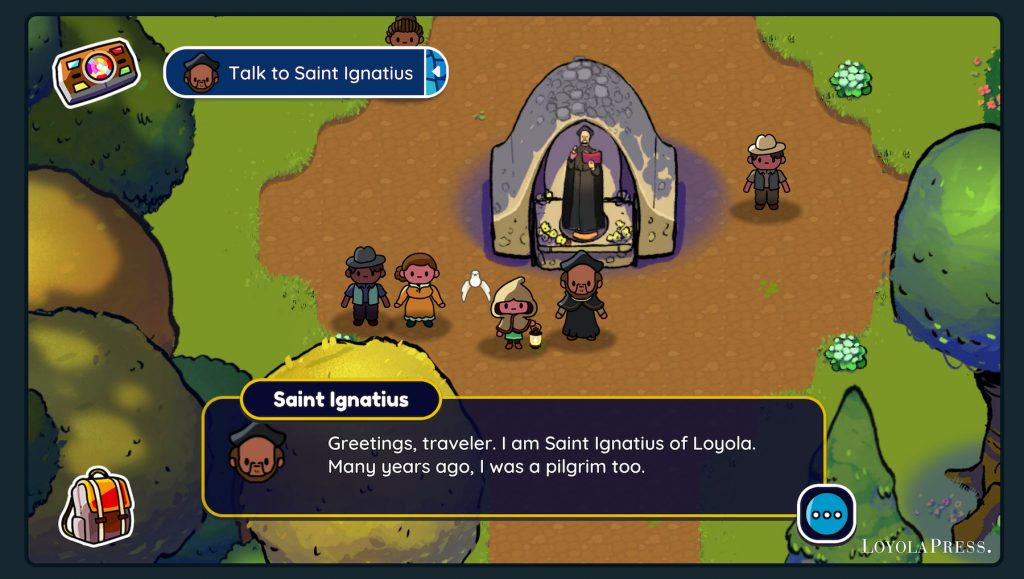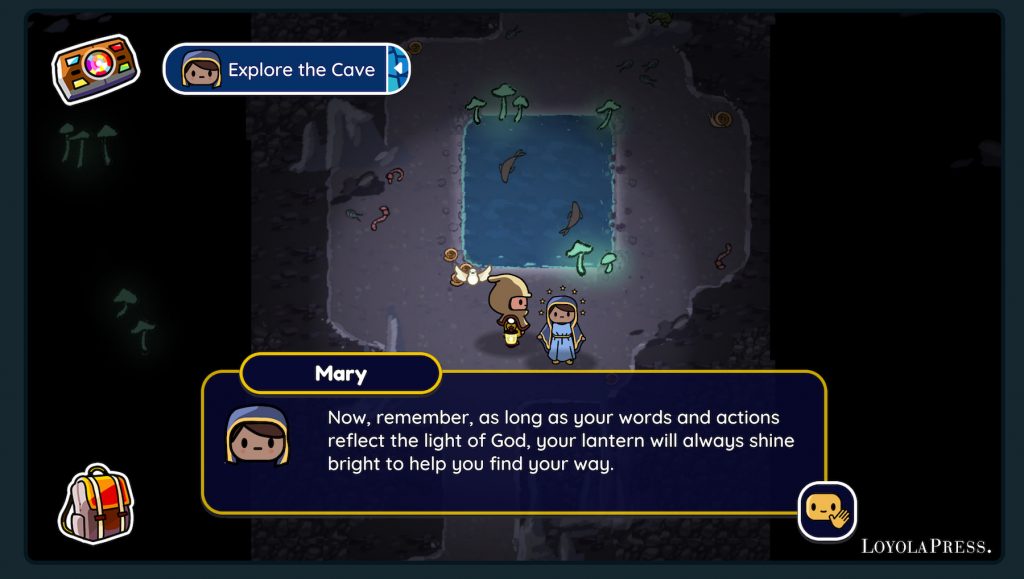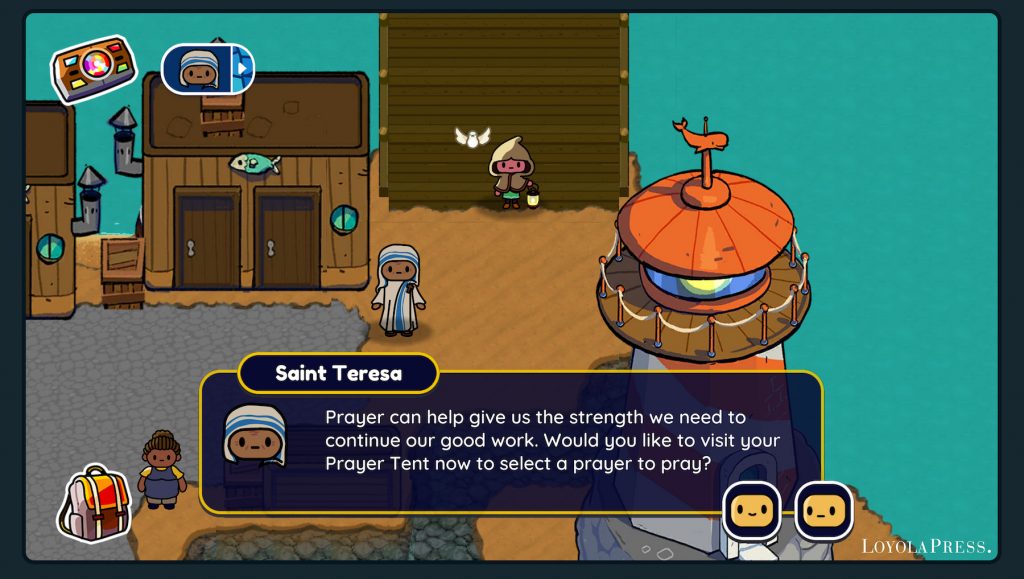
While placing your child in front of a video game in the age of distance learning might seem the least logical choice you’ll make this school year, a new catechetical resource from Loyola Press may change your mind. Today, I’m happy to share my recent conversation with Joellyn Cicciarelli, President, and Publisher of Loyola Press, who introduces us to an ambitious new learning tool being launched this month.
About Wanderlight:
Wanderlight: A Pilgrim’s Adventure is a groundbreaking Catholic video game for kids of all ages. The game invites players to explore the Catholic Faith in an engaging and beautiful world and venture out in their role as “the Pilgrim”—a seeker on a quest to discover and experience core teachings of the faith while practicing how to “shine their light” and live as a faithful disciple of Jesus Christ.
Joellyn, thank you for your time and for all of the beautiful work of Loyola Press. Would you please briefly introduce us to your special new project, Wanderlight: A Pilgrim’s Adventure?

Hi Lisa! Thank you for having me! I’d love to tell you more about Wanderlight: A Pilgrim’s Adventure™. Wanderlight is what we call an “unapologetically Catholic video game” that is rated E for everyone. It’s an immersive single-player game in which the player, in the role of “The Pilgrim,” goes on a journey (pilgrimage) through a beautiful world and embarks on quests that lead the player to learn more about the faith and practice being a disciple of Christ.
Scripture, traditional and reflective prayer, the sacraments, the Mass, Works of Mercy, and key principles of Catholic Social Teaching are prevalent throughout this incredibly fun game. One thing I love about the game is that it is a game kids will want to play—it’s full of adventure and fun, and not at all “preachy.”
Sacramentals and sacred signs feature prominently in the game. For example, The Pilgrim always has a dove (a representation of the Holy Spirit) over his/her shoulder, ready to be a guide when the player might need some help. The notion of light (walking in the light of Christ, being a child of the Light) is a key focus in the game, too. One example of the use of light is that players are faced with many choices along the way. When the player makes a good choice, The Pilgrim’s lantern shines brighter. When the player makes a bad choice, The Pilgrim’s lantern flickers or dims. And if unsure where to wander, The Pilgrim can always follow the “sparkle path” to find his/her way to the next part of a quest.
The Pilgrim meets a variety of, dare I say, adorable NPCs (non-playable characters)—sometimes to help The Pilgrim and sometimes to be helped by The Pilgrim. The player never knows whom he or she might meet next. It might even be Moses! In the game, Moses helps The Pilgrim learn the Ten Commandments after asking for help in rescuing people from a flood. One cool feature is that players collect miraculous medals each time they meet a saint. They can visit their collection at any time to learn more about lives of the saints they encounter.
One other special feature in the game is the player’s Prayer Tent. This tent provides a vast array of prayer experiences and serves as a lovely respite when players want some quiet time. There is even an interactive rosary. We’ve found that our testers love spending time in the Prayer Tent and that they love the “favorites” feature, where they can mark prayers as favorites. In addition to the Prayer Tent, we’ve built in a variety of fun concept-reinforcing mini-games for when players want a break from the quests.
The game will have full voiceover so non-readers can play, and the game will be available on computers and tablets. We offer a version of the game that can be used by schools and parishes and a version of the game for individual use. The school/parish version has a built-in educator/administrator dashboard so teachers and catechists can note progress and playing time and create a more guided experience if they like.

What inspired this form of catechesis and what went into the development of the game?
This video game has been a dream for Loyola Press for about a decade and has been in development in earnest for over two years. In terms of inspiration, there are many answers.
First, we were inspired by those we serve. People clearly want immersive catechesis that meets kids where they are, which is increasingly online, especially due to the pandemic. Several years ago in Boston, after a parish presentation about our catechetical materials, the pastor pulled me aside and asked, “When are publishers going to develop a video game for catechesis? I think that would be great!” I listened to his ideas—he was quite sure a solid video game could be a big part of the answer for our struggles to find engaging catechesis. . . and from that time on, I paid careful attention to what DREs, principals, pastors, and parents were asking for. Had the time come for a Catholic video game? Would people really embrace this idea? The more we researched, the more we learned that the answer was yes to these questions.
In terms of The Pilgrim, we looked to our patron, St. Ignatius of Loyola, for inspiration. St. Ignatius called himself The Pilgrim in his autobiography. St. Ignatius is famous for saying, “Go in their door, and take them out yours.” The fact is that today, video games and online learning are the kids’ doors. We need to meet them at their door, go in, and hopefully take them out ours, to a real-world that is filled with love for the Church and one that consists of a prayer-filled, sacramental life and a strong moral compass geared toward serving God and his creation.
One other key inspiration for the game for us was to make a game that is literally the opposite of so many of today’s games. The team agreed that we needed to make a game that had the following characteristics: the goal of the game is to love and honor life (rather than hate and kill); the avatar is peaceful (not a warrior); help comes from the Holy Spirit (not from a weapon); the game would have a busy but peaceful quality (rather than being overstimulating); and the ending “reward” would be a prayer in the form of a guided reflection that invites players to be with Jesus (rather than adding up competitive points). Oh, and yes, the game still had to be fun! That was a tall order, but I think we did it.
The development of the game would not have been possible without the help of a partner who understood game development in addition to understanding and respecting the Catholic Church and the people we serve. We searched a long time for the right partner and then eventually chose to work with Fablevision Studios out of Boston. I had worked with Peter and Paul Reynolds of Fablevision in the early 2000s, and I had always admired their work. When I reached out to Paul, he made me aware of a few things I didn’t know about him: his first job out of college was for Boston Catholic Television; he is currently a professor at Boston College; his mother was a Master Catechist; and he once made a catechetical board game for his own children. That, coupled with their experience in developing educational games, helped us know we had found the right partner. Loyola Press put in place an internal team of content writers, catechists, and instructional designers dedicated to the creation of Wanderlight. Our internal team was led by Geri Smith, an expert in computer-delivered education, and Fablevision worked tirelessly on functional game creation.
Check out #wanderlightgame a new Catholic video game and fun teaching tool from @LoyolaPress and @LisaHendey conversation with Joellyn Cicciarelli about what this offers to families, schools, parishes Share on XWith the prevalence of distance learning options, how can Wanderlight be used by educators as a part of their faith formation curriculum?
In the school/parish version of Wanderlight, the game has seven levels: Levels A to G. Each level is unique with different quests and characters. The idea is that there will be one level assigned to each grade: (Grades K to 6, Grades 1 to 7, Grades 2 to 8, etc.) depending on the school’s or parish’s needs. In this way, each child will experience a “new game” every year.
Each teacher/catechist creates a class roster and provides logins for his or her students. The kids can log in from school or from home—they simply need a computer or tablet and an internet connection. Once kids begin to play, teachers/catechists can go into the admin portal to learn which prayers have been favorited, how many quests have been completed, which saints have been encountered, etc. This leveled game experience and the administrative dashboard creates a variety of options for implementation, including:
- Guided Instruction (in class or remote): Teachers/catechists can have students complete a specific quest or series of quests. Once the quest is complete, the class can come together to discuss what students have learned. In this way, the class can move together in the same way they might move through a textbook. Teachers can easily check the admin portal to see if the quest has been completed or not. The website, wanderlightgame.com offers a list of topics that are explicitly covered at each level under For Educators/Faith Connection. Using the game for guided instruction is especially helpful if schools/parish programs decide to teach remotely or land in a back-and-forth situation.
- Homework: Because the game is accessible on computers and tablets, children might be assigned a specific amount of gameplay for homework, ending after a certain quest. Children can then provide a summary of what he or she learned to the teacher/catechist via e-mail or have group discussion in class.
- Free Play: If doing in-class instruction, I can imagine teachers/catechists allowing children to play the game if they’ve finished their work early.
- Computer/Technology Class: Because Catholic schools often require religion to be taught in every subject area, Wanderlight provides a perfect computer/technology class activity to help meet the requirement.
I know that parents will be thrilled to share this game with their children! Why is family-friendly technology so important for the New Evangelization?
The “For Individuals” version of Wanderlight: A Pilgrim’s Adventure is the version of the game for families at home, independent of their religion class. In this version of the game, players can go through all seven levels of the game, unlike the school/parish version which invites players to stay in one level.
For me, family-friendly technology, and in this case Wanderlight, is critical to the New Evangelization because it allows families an opportunity to spend time together, become catechized together, have meaningful family discussion and prayer time, and later go out into the world to serve others as is modeled in the game. Here is one real-life example of how well this game “works” in terms of providing meaningful catechesis and discussion.
Early in development, we gave a brief demo of the game to one of our employees to share with her son, a second-grader. She turned on the tablet, left him with the game, and went to do some work. Hours later, the boy sat down next to his mom and said something like this, “You know what, Mom? Everyone sins. That’s when we make a free choice to disobey God. Sin hurts God and me and others. But I can make a choice not to sin. Does everyone think like this?” Shocked to hear this from her seven-year-old, our colleague asked, “Where did you learn this? Have you been talking to Dad?” The boy remarked that he had learned it in Wanderlight and hadn’t been talking to anyone. They continued their conversation, which was rich and deep and lengthy. Later that night, my colleague texted me to tell me that she had just had one of the best conversations she had ever had with her son. I was delighted for that family—and consoled knowing that the game is accomplishing what we had hoped.
One other aspect of Wanderlight that is special in terms of evangelization is its call to action. In the quests, the Pilgrim practices discipleship, such as attending Mass, feeding the hungry, and caring for God’s creation. Players feel a sense of reward in the game for these practices, and we are hopeful that they will remember this feeling and go out into the real world to do the same things.
I totally agree that most parents will be delighted with this game. I have two children myself (ages 24 and 19), and I would have given anything for this game when they were young. My youngest was particularly drawn to video games, starting when he was about 10 years old. And frankly, he worried me because he was drawn to games that went against everything we believe in as a family. One day I found him playing a non-violent game called Stardew Valley. I noticed that he seemed content after playing, rather than agitated like when he played other games. That observation stayed with me. When we started to look seriously at developing a catechetical video game, I kept asking myself: Can we develop a fun, peaceful game kids want to play, one that helps them learn about their faith and learn to pray—and maybe even become a better person who wants to bring goodness into the real world? The call grew louder. We had to try, and Wanderlight: A Pilgrim’s Adventure is the result.

What do you hope young people will learn by playing Wanderlight?
I have several hopes for young people as they play this game. I hope they discover the beauty and truth of the Catholic faith. I hope they learn and experience many ways to pray, including traditional prayers and reflective prayer like the Examen. I hope they come to know stories from the Bible and go to Scripture after they stop playing. I hope they recognize the saints as holy role models and seek to become more like them. And I hope they take what they learn in the game and bring it out into the real world, seeking to shine their light for all to see as disciples of Jesus Christ.
What are your goals for the project as you launch it?
Because Wanderlight is a completely online experience that doesn’t require any other materials or set-up, because it’s so affordable, and because it can be played by all ages, we hope it spreads to every Catholic home, parish, and school in the country as well as abroad. We don’t mind if a parish or school uses Wanderlight in addition to another form of catechesis—we simply want to enhance what they’re already doing.
Through the game, we hope to spark joyful conversation about the Catholic faith and the good that comes from living as God desires. We want players to recognize that their own real-life can be a pilgrimage, a journey to seek and see God every day, in all encounters, and that celebrating the sacraments and practicing discipleship brings us closer to Jesus.
What additional thoughts or comments would you like to share?
The game launches August 17, 2020, and the website is updated almost daily—so keep visiting wanderlightgame.com.
I mentioned earlier that the game is affordable. In this launch year of the game, the school/parish version of the game is offered as an annual license per student, on a sliding scale based on enrollment. For more information on the school/parish version of the game, including cost, you can call 800-621-1008 and talk to a customer service representative or find your educational consultant at https://www.loyolapress.com/general/find-educational-consultant/. We do offer discounts for the game if schools or parishes use our core faith formation programs: Finding God: Our Response to God’s Gifts and Christ Our Life.
For the individual (family at-home) version of the game, go to the Apple or Google App Store. Once you purchase a subscription for the game on the app, you can log in on your Apple or Android tablet or on any computer. The cost for the subscription is $2.99 per month. Super affordable!
For More Information:
- Wanderlight website: https://www.wanderlightgame.com/
- Loyola Press website: https://www.loyolapress.com/
- Loyola Press Facebook: https://www.facebook.com/LoyolaPress/
- Loyola Press Twitter: https://twitter.com/loyolapress
- Loyola Press Instagram: https://www.instagram.com/loyolapress/

For Heaven’s sake — I WANT TO BUY THIS but that seems to be impossible!
Are you accepting my email address yet?
If you go to https://www.wanderlightgame.com/ you can click on the purchase now link.